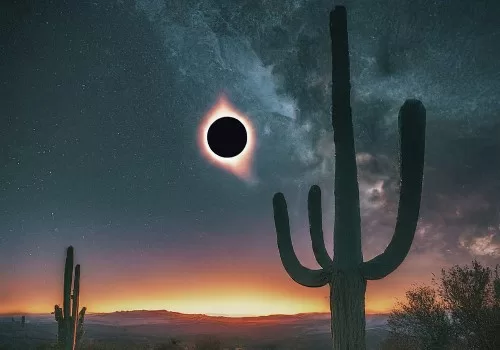Mark Your Calendars! The Total Solar Eclipse of 2024 is Coming to North America

Mark Your Calendars! The Total Solar Eclipse of 2024 is Coming to North America
Get ready for a celestial spectacle unlike any other! On April 8th, 2024, skywatchers across North America will be treated to a total solar eclipse, an event where the moon completely covers the sun, plunging the day into temporary darkness. This awe-inspiring phenomenon is sure to leave you breathless, and if you’re lucky enough to be in the path of totality, you’re in for an unforgettable experience.
A Cosmic Alignment
A total solar eclipse occurs when the sun, moon, and Earth align perfectly. The moon’s shadow, cast by blocking the sun’s light, sweeps across a narrow path on Earth’s surface. This path, known as the path of totality, is where the complete blackout of the sun will be visible. For those outside the path, a partial eclipse will still be observable, but it won’t be quite as dramatic.
The Path Across North America
The 2024 total solar eclipse will begin off the Pacific coast of Mexico before making landfall in Texas. It will then travel on a diagonal path northeast across the United States, reaching all the way to Maine. Finally, it will exit North America over Newfoundland, Canada. If you live within the path of totality, mark your calendar and start making plans! This is an event you won’t want to miss.
Witnessing the Spectacle
Being in the path of totality during a solar eclipse is truly a magical experience. Day turns to twilight, and the temperature can even drop slightly. You’ll be able to see the sun’s corona, its wispy outer atmosphere, which is usually hidden by the sun’s bright light. But be warned: looking directly at the sun, even during an eclipse, can damage your eyes. Always use specially filtered solar eclipse glasses to view the eclipse safely.
Don’t Be in the Path? No Problem!
Even if you’re not lucky enough to be in the path of totality, there’s still plenty to see during the 2024 solar eclipse. A partial eclipse will be visible across most of North America. You can find resources online to calculate how much of the sun will be covered in your location. While it won’t be the full show, it’s still a great opportunity to witness the awesome power of celestial mechanics.
The Science Behind the Spectacle
Solar eclipses have been observed for centuries, and they continue to fascinate us today. They offer a glimpse into the delicate dance of our solar system and provide valuable scientific data. Astronomers can use eclipses to study the sun’s corona, which plays a crucial role in understanding space weather.
A Once-in-a-Lifetime Opportunity
The total solar eclipse of 2024 is a rare event that won’t happen again over North America for several years. So, if you have the chance to witness it, don’t miss out! It’s a chance to connect with the universe and experience the wonder of our solar system firsthand.





